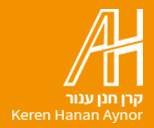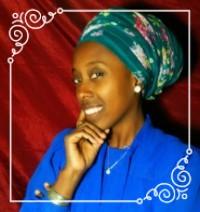Master’s degree in dance and movement
Sand Prints on our Hearts: A Journey to Song and Dance
To look at Liora Daggo, one would never know she had hungered or struggled a day in her life. Her smooth, glowing skin, bright eyes and contagious smile, light up her face, as her Hebrew name suggests. Liora travelled the road of life and survival is written on her soul. Her will to live and positive grace and determinism flow through her as she enters the room.As she tells of her journey across the expansive desert of Sudan, my mind wanders into the image she tells – a colorful story of loss and longing, survival, strength of spirit and song. As an artist, she carefully paints the portrait that is her story – her childhood, youth and early adult years and welcomes us all to listen with our hearts.Liora is a woman who, despite her tender years, has experienced so much and yet shares only joy, warmth and the will to go on against all odds, in movement and in song. Her voice and insight remain strong, lyrical and committed, like a parent nurturing a child.
She is a life line, to generations past and her children of the future.
A second time Keren Aynor scholarship recipient, she speaks of her thanks and admiration to those who have supported her. Liora expresses an immense gratification to Keren Aynor for being her ongoing support throughout her studies, a constant backing while she pursues her dreams. Through her relationship with Keren Aynor, she gains a great deal of self confidence and self worth and holds this dear as she continues her studies and watches her family grow. In the generous way in which she raises her children and helps others in her community, it is clear that she is always giving back.
Liora begins telling her tale of the events of 1984 when she arrives in Israel on Aliya as a year and a half old baby on her mother’s back with her sister in tow. She tells of the eight months in the refugee camps, her cries for food and the incomprehensible loss of her four year old brother who never returns after searching for nourishment for the family. Her father remains back in Ethiopia to fulfill his duties as an army man and community worker. They lose touch on the way and he remains a distant memory until he and Liora are finally reunited after that endless separation. She is a second grade student here in Israel. She barely recognizes her own father.
She recalls her mother’s tireless strength and determinism to push ahead even after they have been separated from their group en route, Liora’s young mother soothing Liora’s cries for food.
Through her pain shines an abundance of hope.
Liora’s shares her Amharic names, “Bayetsch”, meaning too bad she didn’t see you, referring to her grandma who died before her birth. She also proudly recalls the name her father gave her, “Tihun”, meaning a prayer that she would live on her journey to Israel.
In order to survive the hardships of the journey, Liora’s mother tied a cross around her neck and travels on with the next group until they reach the encampment, travel by truck at night and then aboard that famous airplane, that desert winged bird which would rescue them carrying them to the land they had longed for, thus fulfilling an age old dream of the return to Zion.
Soon after arrival, Liora, her mother and sister were sent to an absorption hotel in Nahariya, in Northern Israel. Life in Israel was not always easy. The challenges of a new language and culture abound. In 1985, the family moved to Kiryat Yam into an apartment of their own and the children began attending the local religious school and kindergarten.
Liora began experiencing health problems, including respiratory issues from the abundance of sand she had inhaled en route as a baby. Although a very young girl, Liora claims she vividly remembers this time in her life.
Liora goes on to talk about the meeting with her father and his new family. After losing contact with Liora’s mother, her father remarried and had other children. They remain close with Liora and remain as though they are one close family unit. Liora refers to her father with great admiration; a singer and community worker, a charismatic man. Unfortunately, he dies years later of infection following one of his yearly trips to Ethiopia. Liora remains in constant contact with his second wife and young children.
From a young age, Liora was artistic. She loved to sing and dance and yearned to release her creative soul. Throughout elementary, middle school and high school, Liora remained involved in artistic ventures and strived to explore her talents within the framework of the religious educational system.
Upon completion of her matriculation exams, Liora joined the National Service program and worked in the Jewish quarter of the Old City in Jerusalem. She was responsible for facilitation with Ethiopian youth. She tells of this experience with great pride and the desire to help other new Olim, which is something she never felt she had. She tells vividly of her incredible connection and work with a young boy who the authorities had wanted to send away to an institution. She confidently recalls about how she reached him and how he made incredible progress in that year.
Her message is one of constant hope and positivity and the desire not to fall into the trap of discrimination. It’s a message of being good and doing goodness and not making place for people who try to bring you down. Liora speaks of the hurt and difficulty, along with an innate message from her mother of moving forward. Moreover, she refers to the protests last summer by the Ethiopian Israeli community as a political and personal message to the public and a thank you to the generation who “carried us” this far.
Liora began her academic career studying special education and music and learned to play piano. Through her piano teacher, she joined a community of musicians and students of music and is asked to perform for the Dalai Lama. She chose a soulful song in her native Amharic and Hebrew and relates to this experience as pivotal in her professional career, describing it as a truly spiritual experience.
In 2006, Liora married her partner, a Reggae rock musician whom she had met prior to that when she joined his band. The couple has five children ranging in age from a year to nine years of age. Liora’s face lights up when she tells of her children and it is no surprise that her eldest is called Neshama (meaning soul, life breath in Hebrew). It is evident that everything about Liora and her family is all soul and life. While the children were really young, Liora worked as a teacher for both elementary and middle school children, mainly in special education and as a main homeroom teacher. At this time, Liora yearned passionately for something else creative to flow out of her.
Liora then became more involved in movement and dance, relating to the power of movement on the body. Movement becomes a means to loosen the body, enjoy, and release tension and anger. She discovered what she calls “my dance” and the desire to learn more. Liora auditioned and was accepted into the improv and hadracha program at “hallelu” the dance school. Dance and movement become an all encompassing means of expression. She went on to receive a certificate as a madricha of improvisation and contact in belly dance. She then joined a local troupe and performed for a variety of populations. Through the improv, it becomes evident to her how people can connect to themselves in a more meaningful way. The beauty of the form is that it changes every time, its dynamism carefully tailored to the needs of the community at hand. Through these connections, Liora decides to begin a more therapeutic master’s degree in dance and movement at the David Yellin Teacher’s College in Jerusalem.
Something within her body meets up again with the young girl of her childhood, hungrily nursing off her mother’s breast. This body memory remains powerful within her.
Liora is inspiring. She works to be a role model both to her family and her community. She speaks of giving back and helping others in the way in which the generous contributors of Keren Hanan Aynor have helped her. She strives to rise up for the next generation and is actively involved in the coordination of the Ethiopian Israeli students group at the college, where she is an integral part of offering support and hands on assistance to new students.
Still quite young, Liora has dedicated her life’s work to that voice inside her which yearned to break free in movement and song. Both personally and professionally, she strives to embody her mother’s words of conquering all with a keen sense of positivity.
And although Liora’s journey in the desert has come to an end, her journey here in Israel propels her forward each and every day, not unlike a prayer or ritual engraved within our souls at once old and familiar and yet pulsing anew with her rhythm that is the beating of her heart.



